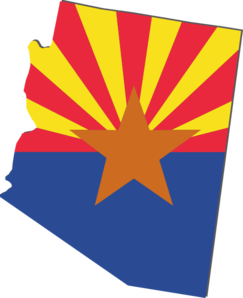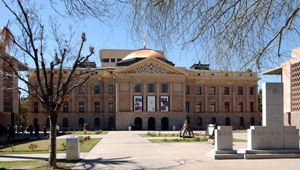December 9, 2014 •
Arizona Definition of Political Committee Found Unconstitutional
On December 5, a federal judge declared Arizona’s definition of political committee “vague, overbroad, and consequently unconstitutional in violation of the First Amendment.” In Galassini v. Town of Fountain Hills, Senior District Judge James A. Teilborg of the United States […]
 On December 5, a federal judge declared Arizona’s definition of political committee “vague, overbroad, and consequently unconstitutional in violation of the First Amendment.” In Galassini v. Town of Fountain Hills, Senior District Judge James A. Teilborg of the United States District Court for the District of Arizona, relied on his prior determination finding A.R.S. §16-901(19) unconstitutional.
On December 5, a federal judge declared Arizona’s definition of political committee “vague, overbroad, and consequently unconstitutional in violation of the First Amendment.” In Galassini v. Town of Fountain Hills, Senior District Judge James A. Teilborg of the United States District Court for the District of Arizona, relied on his prior determination finding A.R.S. §16-901(19) unconstitutional.
In 2011, Gina Galassini emailed 23 friends and neighbors to organize a rally opposing a bond proposal in the town of Fountain Hills. The town clerk informed Galassini her planned rally would require she “file a statement of organization before accepting contributions, making expenditures, distributing literature or circulating petitions.” However, Galassini was still able to hold her rally without registering after the District Court issued a preliminary injunction and the Town of Fountain Hills agreed to not enforce the campaign finance laws.
Friday’s decision granting declaratory relief to the plaintiff did not provide any future injunctive relief. According to the Arizona Daily Star, Deputy Secretary of State Jim Drake said his office will ask the Court to delay the effect of the ruling while an appeal is considered.
May 22, 2014 •
AZ Governor Calls Special Session
Today Arizona Gov. Jan Brewer called for a special session of the Legislature to convene on May 27. According to Brewer’s press release, the purpose of the special session will be to “overhaul the state’s child safety system” by creating […]
 Today Arizona Gov. Jan Brewer called for a special session of the Legislature to convene on May 27.
Today Arizona Gov. Jan Brewer called for a special session of the Legislature to convene on May 27.
According to Brewer’s press release, the purpose of the special session will be to “overhaul the state’s child safety system” by creating and funding an entity called the Department of Child Safety, “a new, stand-alone agency whose sole focus is the safety of Arizona’s children.”
If passed, the state child welfare programs would be removed from the authority of the Department of Economic Security.
The regular session adjourned on April 24.
Photo of the Arizona State Capitol courtesy of Jeff Dean on Wikimedia Commons.
April 24, 2014 •
AZ Legislature Adjourns
The Arizona Legislature adjourned its session sine die at 1:46 a.m. Thursday, April 24. Gov. Jan Brewer has 10 days to sign or veto legislation transmitted to her or the legislation becomes law automatically.

The Arizona Legislature adjourned its session sine die at 1:46 a.m. Thursday, April 24.
Gov. Jan Brewer has 10 days to sign or veto legislation transmitted to her or the legislation becomes law automatically.
Today the Phoenix, Arizona City Council is expected to vote on whether to create a city ethics commission and whether to add a gift policy to its ethics policies. According to the council’s agenda for the meeting, the proposed gift […]

Today the Phoenix, Arizona City Council is expected to vote on whether to create a city ethics commission and whether to add a gift policy to its ethics policies.
According to the council’s agenda for the meeting, the proposed gift policy identifies permissible and prohibited gifts for elected officials, employees, board members, and volunteers.
It also identifies permissible gifts to elected officials required to be disclosed on a form submitted to and posted by the city clerk.
According to AZCentral.com, the proposed ordinance would allow officials to avoid disclosing event tickets, food, drinks, transportation, or lodging they received as long as such gifts were related to economic development, tourism promotion, or a sister-cities program.
If passed, the ordinance would also create an ethics commission authorized to receive allegations of ethical violations, investigate, take testimony, and engage in any other activity in order to oversee the investigation and enforcement of the gift policy and other conflicts of interest.
The meeting is scheduled to start at 3:00 p.m.
December 18, 2013 •
Arizona’s Supreme Court Allows Higher Political Contribution Limits
On December 17, 2013, the Arizona Supreme Court found House Bill 2593 to be constitutional, allowing newer and higher political contribution limits to take effect. On October 15, 2013, a state Court of Appeals had directed the secretary of state […]
 On December 17, 2013, the Arizona Supreme Court found House Bill 2593 to be constitutional, allowing newer and higher political contribution limits to take effect.
On December 17, 2013, the Arizona Supreme Court found House Bill 2593 to be constitutional, allowing newer and higher political contribution limits to take effect.
On October 15, 2013, a state Court of Appeals had directed the secretary of state not to enforce the new law, which had become effective on September 13, 2013. The lawsuit challenging the constitutionality of the new law was brought by the Citizens Clean Elections Commission and others from the state.
Individuals and noncertified political committees may now give $2,000 to candidates running for legislative and statewide offices who do not participate in the state’s Citizens Clean Elections Act campaign financing system. Contributions made to candidates running for local office may be made in amounts up to $2,500. Contribution limits by committees certified by the secretary of state have also been increased.
Additionally, H.B. 2593 removes aggregate contribution limitations for individuals and some political committees.
October 16, 2013 •
New AZ Contribution Limits Blocked
Constitutionality Challenged
 On October 15, 2013, an Arizona Court of Appeals directed the secretary of state not to enforce the law concerning contribution limits enacted in House Bill 2593, which had became effective on September 13, 2013.
On October 15, 2013, an Arizona Court of Appeals directed the secretary of state not to enforce the law concerning contribution limits enacted in House Bill 2593, which had became effective on September 13, 2013.
According to the Arizona Daily Star, the courts’ three-judge panel found the new law illegal without explaining the basis of its decision. The lawsuit challenging the constitutionality of the new law was brought by the Citizens Clean Elections Commission and others from the state.
Changes in the law include allowing individuals and noncertified political committees to give $2,000 to candidates running for legislative and statewide offices who do not participate in the state’s Citizens Clean Elections Act campaign financing system and removing the aggregate contribution limitations for individuals and some political committees.
October 8, 2013 •
New AZ State Director of Elections Announced
Begins October 21
 Beginning on October 21, Christina Estes-Werther will be the new Arizona state election director, replacing Amy B. Chan.
Beginning on October 21, Christina Estes-Werther will be the new Arizona state election director, replacing Amy B. Chan.
Estes-Werther currently serves as Governor Brewer’s deputy general counsel. According to Secretary of State Ken Bennett’s press release, Chan will be stepping down to devote more time to her family.
Chan was appointed election director by Bennett in March 2009.
October 4, 2013 •
AZ AG Agrees Separate Candidate Committees Needed for Primary and General Elections
HB 2593
 On October 2, Arizona Attorney General Thomas C. Horne joined with Secretary of State Ken Bennett by concluding the law under newly enacted House Bill 2593 requires separate candidate committees for the primary and general elections and contribution limits still apply to committee-to-committee transfers. The attorney general amended an opinion in which it had previously stated, “The best practice might be to set up two separate candidate committees (for the primary and general elections), but the statutes do not necessarily require it.”
On October 2, Arizona Attorney General Thomas C. Horne joined with Secretary of State Ken Bennett by concluding the law under newly enacted House Bill 2593 requires separate candidate committees for the primary and general elections and contribution limits still apply to committee-to-committee transfers. The attorney general amended an opinion in which it had previously stated, “The best practice might be to set up two separate candidate committees (for the primary and general elections), but the statutes do not necessarily require it.”
The secretary of state has advised that transfers between committees for election in the same year are subject to the contribution limit of $2000.
September 13, 2013 •
Political Contributions Limits Increase in Arizona
No Aggregate Contribution Limitations
 A new law in Arizona raising the limits of political contributions to candidates took effect today. Individuals and noncertified political committees will now be able to give $2,000 to candidates running for legislative and statewide offices who do not participate in the state’s Citizens Clean Elections Act campaign financing system. Contributions made to candidates running for local office may be made in amounts up to $2,500. Contribution limits by committees certified by the secretary of state have also been increased.
A new law in Arizona raising the limits of political contributions to candidates took effect today. Individuals and noncertified political committees will now be able to give $2,000 to candidates running for legislative and statewide offices who do not participate in the state’s Citizens Clean Elections Act campaign financing system. Contributions made to candidates running for local office may be made in amounts up to $2,500. Contribution limits by committees certified by the secretary of state have also been increased.
Additionally, the new law removes aggregate contribution limitations for individuals and some political committees.
Meanwhile, a lawsuit challenging the constitutionality of the new law, which was brought by the Arizona Citizens Clean Elections Commission and others from the state, is pending in Maricopa County Superior Court.
April 15, 2013 •
Arizona Raises Political Contribution Limits
Removes Aggregate Contribution Limitations
 A bill raising the limits of political contributions to candidates in Arizona has been signed into law.
A bill raising the limits of political contributions to candidates in Arizona has been signed into law.
On April 11, Governor Janice K. Brewer signed House Bill 2593, allowing increases in contribution amounts individuals and some political committees may make to candidates.
Individuals and noncertified political committees will be able to give $2,500 to candidates running for Arizona local, legislative, and statewide offices. Committees certified by the secretary of state to give at the upper limit can contribute up to $5,000 to a statewide candidate.
The bill removes the aggregate contribution limitations for individuals and some political committees. The law will take effect 90 days after the Legislature adjourns sine die.
January 31, 2013 •
Arizona Political Contribution Limits Updated
2013-2014 Election Cycle
 The Arizona Office of the Secretary of State has released the 2013-2014 election cycle contribution limits.
The Arizona Office of the Secretary of State has released the 2013-2014 election cycle contribution limits.
Individuals and noncertified political committees can now contribute up to $912 to a statewide candidate, $450 to a non-statewide local candidate, and $440 to a non-statewide legislative candidate. Additionally, committees certified by the state may contribute up to $4,560 to a statewide candidate, $2,270 to a non-statewide local candidate, and $1,816 to a non-statewide legislative candidate. These limits apply to candidates not receiving public funds under the Citizens Clean Elections Act.
Other changes include allowing individuals to make annual political contributions up to $6,390 to political committees or candidates. The contributions limits are required by law to be adjusted every two years.
January 15, 2013 •
Legislative Sessions to Watch
This week we see the first day of session for the following legislatures:
 Monday, January 14, 2013
Monday, January 14, 2013
Legislative Assembly of Puerto Rico
Tuesday, January 15, 2013
Wednesday, January 16, 2013
November 7, 2012 •
Arizona Voters Reject Top-Two Primary Election System
Voters Also Reject Judicial Changes
 Voters rejected changing Arizona’s primary election system to a top-two structure.
Voters rejected changing Arizona’s primary election system to a top-two structure.
Proposition 121 would have allowed primary elections in which all voters, regardless of party affiliation, vote in a single and combined primary. The top two vote-getters for each seat would then have advanced to a general election ballot. The proposition would not have affected elections where no party affiliation appears on a ballot.
Voters also rejected a proposition aimed squarely at the judicial department. Proposition 115 would have increased the term length of judges and raised their retirement ages.
The proposition additionally included procedural changes, such as requiring court decisions to be published online, requiring the Supreme Court to send copies of judicial performance reviews for each judge who is up for retention to the legislature, and allowing a joint legislative committee to meet and take testimony on justices and judges up for retention.
October 22, 2012 •
AZ County Court Rules Some Campaign Finance Laws Unconstitutional, But SOS Says Reporting Still Required
Express Advocacy v. Issue-Oriented Speech
 Certain Arizona statutes requiring registration and reporting by political committees are unconstitutional, according to a ruling made by Maricopa County Superior Court Judge Crane McClennen on October 10, 2012. Presently, however, reporting is still required, according to the Secretary of State.
Certain Arizona statutes requiring registration and reporting by political committees are unconstitutional, according to a ruling made by Maricopa County Superior Court Judge Crane McClennen on October 10, 2012. Presently, however, reporting is still required, according to the Secretary of State.
The Secretary’s office e-mailed registered political committees the following: “By way of gentle reminder, the recent trial court decision in ‘Committee for Justice and Fairness v. the Secretary of State’ does NOT affect the requirements to file campaign finance reports.”
In deciding whether a television advertisement made by the Committee for Justice & Fairness (CJF) was “express advocacy” or issue-oriented speech, and therefore requiring registration and reporting by CJF as a political committee, the county court found, “A.R.S. §§16–901, –901.01, –902.01, –913, and related statutes are unconstitutional.”
The Secretary of State will appeal the ruling, according the Verde Independent.
State and Federal Communications, Inc. provides research and consulting services for government relations professionals on lobbying laws, procurement lobbying laws, political contribution laws in the United States and Canada. Learn more by visiting stateandfed.com.


